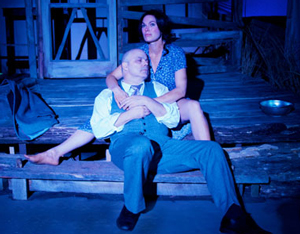
When you're cast as Stanley Kowalski in high school (an all-boy's school yet!), you quickly abandon hopes of someday playing Romeo, or Hamlet—or any role where you get to kiss the girl, for that matter. Steve Pickering has made a career of playing tough guys—Iago in Othello (twice), Kent in King Lear, Harry Brock in Born Yesterday. "When have I ever played a love scene where I didn't kill the woman ten minutes later?" he remarks ironically, then adds, "Or she didn't kill me?"
Asked why he always seems to land these kind of roles, Pickering rejects the term "type-casting", citing the variety of characters on his resume. "Not many actors can boast that they've played both Puck and Coriolanus—and then Moonface Martin in Anything Goes! When I was young, what I wanted was to do the roles that I thought Toshiro Mifune would do—I was crazy about the films of Akira Kurosawa. Oh, and the British Knights, especially the athletic fight-guy risk-taking roles like Laurence Olivier," he shrugs, "My enthusiasm probably came across to folks looking for those skills."
Did you ever get tired of playing badasses? "I think I've developed a fondness for the bad guys," he admits, "Actors don't like doing the same thing over and over, but villainy makes for stimulating ways of approaching your work. I've been blessed with guidance from directors like Michael Maggio and Eric Simonson, who were genuinely intrigued by these characters' fears and loathings, as well as the relationship the audience might have with them. And let's not forget Robert Falls, who will strip your skin off if you start drooling dishonesty on his rehearsal-room floor."
You played a younger Jamie Tyrone for Robert Falls in Long Day's Journey Into Night at the Goodman in 2002. Did you carry anything over from that production, playing Jamie in Moon For The Misbegotten? Pickering thinks a minute before replying, "I felt a bit more prepared for him now than I did before. When I reference the Tyrone family in Moon, I have, in my mind's eye, the actors from that production—David Cromer, Brian Dennehy and Pamela Peyton-Wright." He sighs, "Jamie is never a gratifying experience for an actor to play. He's charming at times, but in the end, he's a lost cause and he understands, down to the fiber of his soul, that he's a lost cause-the epitome of everything that we wish we had done differently in life."
He also has possibly the longest love scene in western literature, taking up almost the entire second act. How did you prepare for that? "Doing co-ed scenes are so rare for me that I usually just follow the actress's lead. The beauty of this play is that, at its roots, it's Josie's story." He smiles ruefully, "Our rehearsal period was very chaotic-I don't remember Carolyn [Klein, playing Josie] and I ever having a chance to discuss the arc of that whole scene with [director] Kevin [Theis]."
How, then, did you find it? "Carolyn had posted a 'Jim and Josie' playlist on the net, with songs that she thought defined the characters' relationship—they filled in some of the emotional information I needed. I also got some notes from [company artistic director] Michael Grant after our first preview to help me avoid the 'anger' trap. Then on opening night, Carolyn and I met an hour early to discuss some new things we could try."
And did it work? "It gave us a solid start for growth. The Seanachai space offers opportunities for a quiet intimacy that allows me to play a softer side than I usually do-and that's really enjoyable!"
Mary Shen Barnidge
Contributing Writer

 Follow Us On Twitter
Follow Us On Twitter